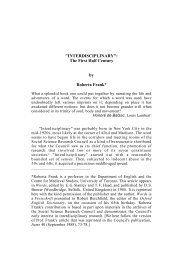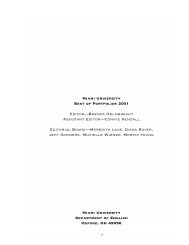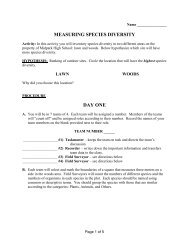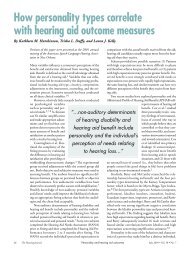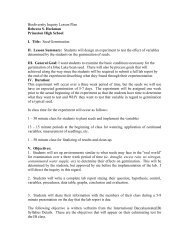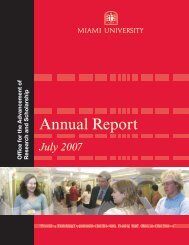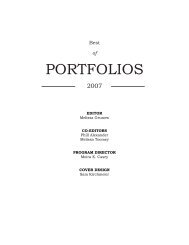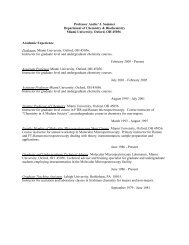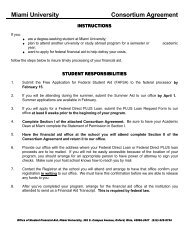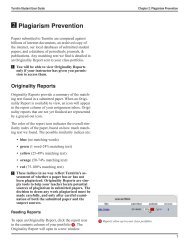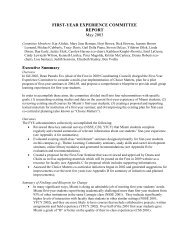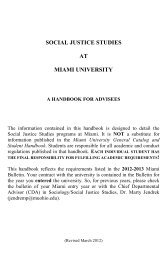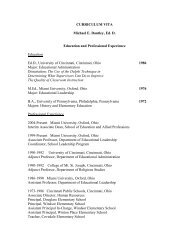Interdisciplinary Research Manual - Units.muohio.edu
Interdisciplinary Research Manual - Units.muohio.edu
Interdisciplinary Research Manual - Units.muohio.edu
You also want an ePaper? Increase the reach of your titles
YUMPU automatically turns print PDFs into web optimized ePapers that Google loves.
25<br />
studying class in capitalist societies, Marx and Engel’s The Communist Manifesto is a<br />
classic text; if Marx himself is the focus of your study, however, the same book is a<br />
primary document. Primary texts are analogous to works of art studied by an art historian<br />
or artifacts collected an anthropologist. They are phenomena to be studied in their own<br />
right and thus important (maybe even crucial) to your project, but they don’t belong in<br />
your literature review. The issues are raised in secondary sources, the scholarly work<br />
commenting on those primary texts or documents.<br />
The literature review is not about your opinions on the issues or positions you find<br />
in the literature; it’s about them not you, about their work not yours, their ideas not yours.<br />
Granted, writing a lit review requires you to make all kinds of judgments in order to<br />
describe their work and to decide whether it’s relevant to your project and thus belongs in<br />
your lit review. And the books you examine don’t always identify the larger issue, so<br />
you may have to come up with a label for it; and they typically don’t say who the key<br />
players are, so you have to infer it. You have to judge whether an issue is relevant to your<br />
project (bearing in mind that inconvenient positions—one’s that don’t support the<br />
argument you want to make—are very much relevant). If you feel the urge to challenge<br />
something you’re reading for your lit review, put your comments in a file on that topic or<br />
author or issue, not in your lit review. If you were to include your opinions, you would<br />
actually undercut the usefulness of the lit review; you want to be able to contrast your<br />
opinions with those of other authors, and you lose the contrast when they are<br />
intermingled.<br />
Without a literature review, you would put yourself in the position of trying to<br />
write your project in an intellectual vacuum, unaware of the relevant conversations taking<br />
place in the various professional literatures that have potential bearing on your topic. You<br />
not only miss opportunities to enrich your argument, but your project comes across to the<br />
very experts you most want to impress as naïve and ill-informed. They assume that a<br />
project on your topic will deal with the issues they are used to seeing addressed; they<br />
expect to see certain discourse communities represented. If they are to take your project<br />
seriously, you have to show them how you address the issues they think should be<br />
included; even if you make the case for why one of these issues should not be included,<br />
you at least need to acknowledge it. Put differently, you need to show them how what<br />
you are interested in relates to what they are interested in, so they know how to approach<br />
your project. Then they are in a position to appreciate what you are doing and more<br />
predisposed to take it seriously.<br />
Identifying issues. We speak of the issues in a lit review being “discussed” or<br />
“debated,” but that may in fact be a figure of speech, not an accurate description of the<br />
professional literature. In a literature review for a disciplinary project, you can feel<br />
confident that scholars in the same discipline and interested in the same issue will<br />
actually read each other’s work. They really are engaged in a discussion or debate in the<br />
discipline’s professional literature. But when you are writing a literature review for an<br />
interdisciplinary project, you are interested in issues that may cut across disciplinary<br />
lines. In that case, the scholars from different disciplines writing on different aspects of<br />
the issue typically do not read each other’s work. You may be the only one who realizes<br />
that a larger “conversation” is in progress in which the overall issue is being “debated.”<br />
It’s your job to identify the larger issue of which those aspects are a part, and bring them<br />
together in your lit review (and then in your project). This task of issue construction may



